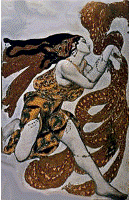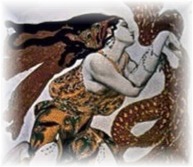
a life in the arts—the life of
Wilfred Owen
—Contributed by ETAF
Staff
Wilfred Owen, perhaps the greatest English poet to come out of WW1, was born March 18, 1893, in Oswestry,
Shropshire, England, and was killed in action in the First World War,
on November 4, 1918, in France. He is noted for his anger at the cruelty and waste of war
and his pity for its victims. He also is important for his technical
experiments in poetic assonance, which were particularly influential in the
1930s.
Background
Owen was educated at the Birkenhead Institute and matriculated at
the University of London; after an illness in 1913 he lived in France.
He had already begun to write and, while working as a tutor near
Bordeaux, was preparing a book of “Minor Poems—in Minor Keys—by a
Minor,” which was never published. These early poems are consciously
modeled on those of John Keats. Often ambitious, they show enjoyment
of poetry as a craft.
In 1915 Owen enlisted in the British army. The experience of trench
warfare brought him to rapid maturity; the poems written after January
1917 are full of anger at war's brutality, an elegiac pity for “those
who die as cattle,” and a rare descriptive power. In June 1917 he was
wounded and sent home. While in a hospital near Edinburgh he met the
poet
Siegfried Sassoon, who shared his feelings about the war and who
became interested in his work.
Reading Sassoon's poems and discussing
his work with Sassoon revolutionized Owen's style and his conception
of poetry.
Despite the plans of well-wishers to find him a safe staff job,
he returned to France in August 1918 as a company commander. He was
awarded the Military Cross in October and was tragically killed a week
before Armistice Day.
Accomplishments
Published posthumously by Sassoon, Owen's single volume of poems
contains the most poignant English poetry of the war. His collected
poems, edited by C. Day-Lewis, were published in 1964. His collected
letters, edited by his younger brother Harold Owen and John Bell, were
published in 1967.
 Principal Works
Principal Works
Dulce
Et Decorum Est, Owens' masterpiece, a 28-line poem,
is one
of the world's great antiwar poems. He wrote it intending it to be an answer to Homer's Iliad
and Virgil's Aeneid.
- Read Owens' poem, Dulce
Et Decorum Est. Visit The Muse of Literature's page containing the
poem, where you will also find an appreciation by The Muse Of Literature:
click here.
Television Documentary
The Owen-Sassoon story is portrayed in a moving and informative
documentary about their time together written for television by the
BBC called Regeneration.
- See more about Regeneration at the BBC site:
click here.
the Wilfred Owen Association
The Wilfred Owen Association is an organization dedicated to
preserving the works and memory of Wilfred Owen.
First World War Poetry and Prose
For more about Wilfred
Owen and other figures prominent in war poetry and prose, visit the
poetry and prose section of
FirstWorldWar.com, a web site covering many aspects of that war.
ETAF Recommends
See ETAF's recommendations:
click here.



